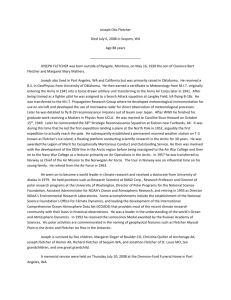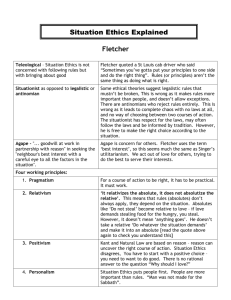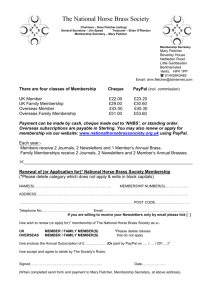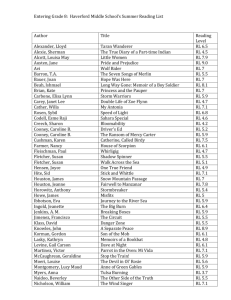RSC Meeting Minutes 2/20/15
advertisement
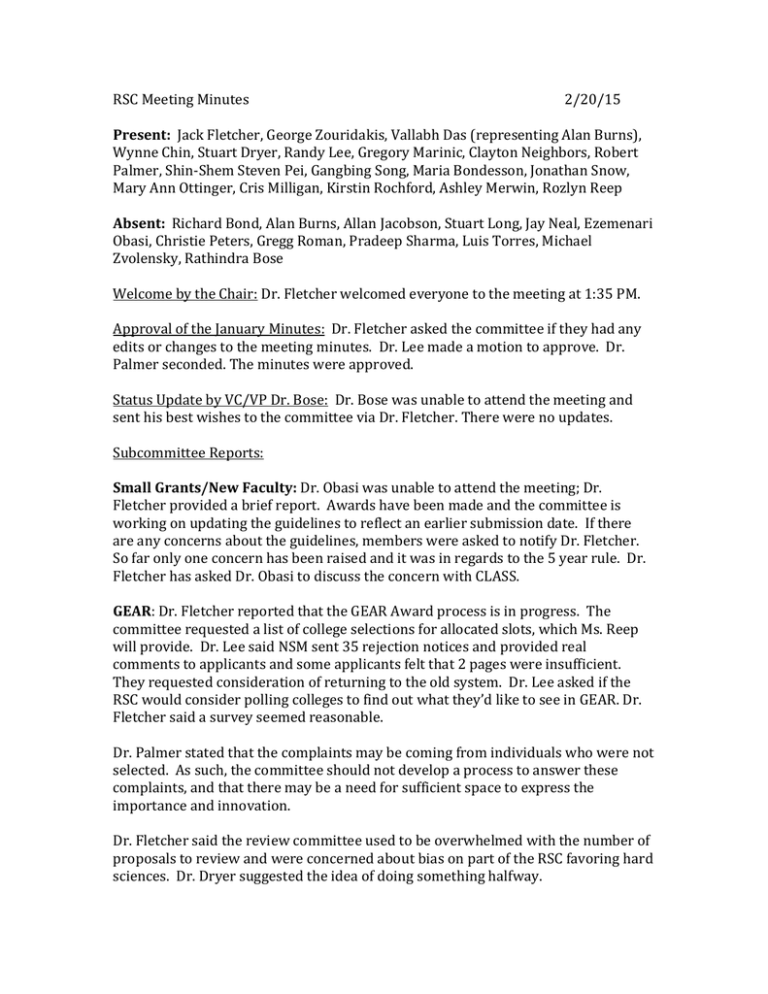
RSC Meeting Minutes 2/20/15 Present: Jack Fletcher, George Zouridakis, Vallabh Das (representing Alan Burns), Wynne Chin, Stuart Dryer, Randy Lee, Gregory Marinic, Clayton Neighbors, Robert Palmer, Shin-Shem Steven Pei, Gangbing Song, Maria Bondesson, Jonathan Snow, Mary Ann Ottinger, Cris Milligan, Kirstin Rochford, Ashley Merwin, Rozlyn Reep Absent: Richard Bond, Alan Burns, Allan Jacobson, Stuart Long, Jay Neal, Ezemenari Obasi, Christie Peters, Gregg Roman, Pradeep Sharma, Luis Torres, Michael Zvolensky, Rathindra Bose Welcome by the Chair: Dr. Fletcher welcomed everyone to the meeting at 1:35 PM. Approval of the January Minutes: Dr. Fletcher asked the committee if they had any edits or changes to the meeting minutes. Dr. Lee made a motion to approve. Dr. Palmer seconded. The minutes were approved. Status Update by VC/VP Dr. Bose: Dr. Bose was unable to attend the meeting and sent his best wishes to the committee via Dr. Fletcher. There were no updates. Subcommittee Reports: Small Grants/New Faculty: Dr. Obasi was unable to attend the meeting; Dr. Fletcher provided a brief report. Awards have been made and the committee is working on updating the guidelines to reflect an earlier submission date. If there are any concerns about the guidelines, members were asked to notify Dr. Fletcher. So far only one concern has been raised and it was in regards to the 5 year rule. Dr. Fletcher has asked Dr. Obasi to discuss the concern with CLASS. GEAR: Dr. Fletcher reported that the GEAR Award process is in progress. The committee requested a list of college selections for allocated slots, which Ms. Reep will provide. Dr. Lee said NSM sent 35 rejection notices and provided real comments to applicants and some applicants felt that 2 pages were insufficient. They requested consideration of returning to the old system. Dr. Lee asked if the RSC would consider polling colleges to find out what they’d like to see in GEAR. Dr. Fletcher said a survey seemed reasonable. Dr. Palmer stated that the complaints may be coming from individuals who were not selected. As such, the committee should not develop a process to answer these complaints, and that there may be a need for sufficient space to express the importance and innovation. Dr. Fletcher said the review committee used to be overwhelmed with the number of proposals to review and were concerned about bias on part of the RSC favoring hard sciences. Dr. Dryer suggested the idea of doing something halfway. Dr. Lee said the biggest complaint he received was “it’s too short.” Dr. Dryer said he thinks it needs to be longer. It would be good for reviewers and writers, and sets a higher threshold on expectations which will comb out the herd. Dr. Pei expressed agreement with the length needing to be longer. Dr. Fletcher said one of the longer GEAR grants was turned into a small grant proposal to NIH that was funded at the 4th percentile. The committee will be reviewing 3 years of data in order to evaluate the impact of GEAR. Dr. Fletcher thanked Dr. Ottinger for her assistance in gathering data from the archives for the committee. The committee will be charged with evaluating data as well as continuing the discussion on the guidelines. Centers & Institutes: Dr. Zouridakis reported that his committee has annual reports to review. He will have more concrete information at the next meeting. The committee will also evaluate links with academic center procedures and coordinate with the sister committee. The C&I committee will also look at research cluster definitions. Resources & Core Facilities: Dr. Burns was unable to attend the meeting so Dr. Fletcher gave the committee report. The committee received one major core facility proposal that requested $800,000 for the “enhancement of the scanning electron microscope.” The funds will allow them to purchase three attachments for the microscope, which in turn will allow them to conduct and publish sufficient research to raise funds for the purchasing of a new scanning electron microscope (SEM) with higher resolution. The three attachments will be compatible with the new SEM. After reviewing the proposal the committee put together a report and determined that: “The weaknesses outweigh the strengths. While the instrumentation and the research activities to be enabled are adequately described, the sections describing the need for such a facility and its impact on research and training infrastructure are poorly written. A protocol for establishing user priority on the new equipment is lacking. Moreover, a detailed management plan is absent and there is no consideration given to costs associated with the maintenance of the equipment. Hence, the feasibility of providing sustained access to the new equipment is uncertain. The internal review panel recommended that the proposal not be sent for external review.” Dr. Fletcher told the committee that based on the report the proposal is dead. According to the guidelines, they are unable to send the proposal back to the PI to address concerns. He asked the committee if they should send it back for repair like in the past. Dr. Lee stated that in the past the committee could send back proposals to everyone, giving them a chance to revise. Ms. Milligan read the guidelines to the committee. Dr. Fletcher said it sounded like the issue wasn’t specifically addressed in the guidelines. Dr. Chin, who was part of the review committee, said they looked at the quality of the proposal. They were aware of proposals being sent back in the past for repair, and if you send back one you have to send back all. But what if there were two proposals? What if a PI thought they could submit a proposal just to meet the deadline simply because they knew they could revise and submit at a later date? Dr. Ottinger stated that when she was working with Dr. Burns on the Major Core Facility timeline there was a concern about timing. They wanted to get everything completed by spring in order to allow funding in this fiscal year. If the proposal was revised, she assumed it would go through the review process again. Dr. Fletcher confirmed Dr. Ottinger’s assumption. Dr. Zouridakis said that based on the review, this proposal was not ready to go out for external review. Ms. Milligan said the funds for this initiative came from the FYI 2015 IDC Distribution. While there is no guarantee of the same level of funding next year she suggested the RSC request that the funding for this initiative be set aside for use during the next fiscal year. Dr. Lee said the objective of the proposal was worthwhile. The scanning equipment is very out of date and behind competitors around the world with imaging capability. Dr. Pei said they need to look at resources all over campus. Dr. Palmer stated there’s something wrong with sending the proposal back – there’s a notion that handing in an incomplete proposal is safe. He suggested having the funds carry over and have the competition delayed 3 or 4 months. Dr. Dryer said he has to have things done at MD Anderson – it’s the only place where he can get good images. Ms. Milligan said it sounds like it's a need on campus and suggested sending the comments back to the PI and create a new call for proposals. Dr. Fletcher felt it was a good solution and would allow others to reapply. He would like to see everyone re-compete. Dr. Ottinger asked the RSC about a deadline, and Dr. Fletcher replied that the committee can work out a reasonable timeline and announce the competition again. Dr. Palmer made a motion for a recommendation to Dr. Bose for reopening the competition and Dr. Pei seconded. Dr. Palmer made a second motion to decline the current proposal and send comments back to the PI and Dr. Chin seconded. Both motions carried. The deadline for the competition will be determined by the committee. ACO User Advisory: Dr. Bondesson reported that the committee discussed two items. One was whether SR2 would close or not. It will not close. She asked everyone to relay this information to their researchers. Dr. Fletcher, in order to make things clear, repeated what Dr. Bondesson stated – which was that the animal care facility in SR2 is not closing down. Dr. Bondesson reported that the second item pertained to metabolic cages at TMC. There was a question about who should repair and clean cages. They are currently working on a solution to the problem. Dr. Fletcher said the committee is working and people are talking to each other which was one important goal. Research Misconduct Policy: A new Research Misconduct Policy was prepared and sent to the committee for review. Ms. Rochford was at the meeting to summarize the policy. She said the policy, already reviewed by the Provost’s office and General Counsel, is taking the research misconduct process (specifically related to allegations of falsification, fabrication, and plagiarism) out of the Provost’s ECARS process and moving it under this DOR policy. It follows the ORI process; additional details have been added for research funded by NSF. She provided a flow chart to members showing the process outlined in the policy and informed the committee she’d be happy to circulate the chart electronically if needed. She reviewed feedback from the subcommittee and agreed to make some of the wording regarding the inquiry report tighter. Dr. Das asked Ms. Rochford if there were general guidelines for how the review committee would be constituted. Ms. Rochford said the guidelines for the review committee were taken from ORI, and that Dr. Bose will propose members; however, the Provost will also have input. Dr. Palmer stated that the committee can request folks with expertise – this will allow them to choose good people for the review. Dr. Lee told Ms. Rochford he’d like for there to be a representative from the Faculty Senate and/or from the department. Dr. Dryer mentioned an experience he had serving on a review committee and said it was very difficult considering he was an assistant professor and in the same college as the faculty member. He suggested that those serving on the committee be tenured. Dr. Fletcher told Ms. Rochford the RSC would like more details about how the review committee will be constituted and that it needs to include tenured faculty members. Ms. Rochford said she would take the committee’s recommendations back to Dr. Bose and circulate the updated policy to members for review. She asked the committee if they had any objections to her sending the annual report to the Office of Integrity mentioning the change of roles (Dr. Bose as Research Integrity Officer). Dr. Fletcher said there was no problem with roles being moved to DOR. Dr. Fletcher told the committee he will send out the revised policy and requested everyone to review and vote via email. Publications: Dr. Fletcher reported that the committee is meeting and looking at several different plans and proposals. They will provide a report at the next meeting. IP: Dr. Fletcher reported that the Faculty Senate committee is working on the issue and that it’s just a matter of fixing the bylaws. He recommended that Dr. Palmer be appointed as a representative on the IP committee, which would allow him to represent the RSC. Travel: Dr. Fletcher told the committee that Mr. Mike Glisson asked for a correction to the December minutes. MAPPs require letters from external sources even if the costs are covered 100% externally. MAPPs will be changed and it will not be an issue with Concur, but letters are required until MAPPs is revised and/or a department switches to Concur. Dr. Snow suggested not having an ad hoc group for travel issues, because a faculty senate committee will keep the issue at the forefront. Provost Memo on Tuition: Dr. Fletcher stated there are different issues underlying the issue of putting tuition on grants. One issue is whether the RSC supports the GTF and expanding it, and how to go about funding it. Trying to put tuition on grants will not solve the problem. Dr. Lee said he agrees that the #1 thing is working with administration to let them know how important GTF is to research. If the RSC should write a memo, they need to put the memos in place and go on the record making a formal recommendation that the GTF is adequately funded. Dr. Dryer thinks it’s the single most investment a university can make if it’s Tier 1. It impacts the number of dissertations produced, the number of students, recruiting better students, etc. Dr. Fletcher said the University is competing with other universities in terms of who pays tuition. Drs. Chin & Fletcher will raise the issue the following week at the Faculty Senate Executive meeting. Dr. Fletcher said that under the previously approved resolution passed by the RSC, a faculty member pays 100% of a student’s tuition will get 80% back. Now the faculty member will get 80% of surplus if there is one. No one would be incentivized to put students on grants. But it’s really the wrong issue because the key question is maintaining and expanding the GTF as a tool for supporting research and recruitment. Dr. Lee suggested that the subcommittee of the RSC meet with Dr. Dmitri Litvinov to make sure whatever he’s doing is consistent with what the committee approved. Dr. Fletcher replied that they should work with him to develop a compromise and that there has to be more ideas on how to fund the GTF, i.e. consulting. The University has consulting policies in place which encourage faculty to consult outside the university, but could more directly encourage faculty to bring money into the University for consulting. There’s often no incentive. What about conflict of commitment? There ought to be a faculty committee that looks at these conflicts. It could be a way to raise more money. Dr. Chin stated it’s something they have to figure out and discuss at the Faculty Senate. They need to figure out how to incentivize and get the right people together. Dr. Dryer said the University needs to do what it can to increase the number of students. Dr. Lee said they need more faculty in order to have more students. Dr. Fletcher suggested forming a committee to work with Dr. Litvinov to build the GTF fund. Drs. Obasi and Lee volunteered as well as Dr. Manos Papadakis. Dr. Chin suggested sending the consulting policy to members of the committee. Dr. Fletcher asked members not to just read the policy, but also the Provost’s guidance. He requested that they send him any concerns or questions, and he’ll make sure they’re represented at the Executive committee. Survey of Faculty on DOR Operations: Dr. Fletcher reported that the survey is in the works. Drs. Chin and Fletcher will meet with Dr. Bose to see what information he would like to know. New Business: Dr. Dryer asked Ms. Rochford if she could tell the committee whether there was any progress on getting a software system for IACUC. Ms. Rochford said they saw 6 or 7 demonstrations and looked at systems at Tier 1 institutions. They submitted a request for a module (Huron). It’s currently going through an approval process. Dr. Fletcher said he would like to have the RSC come up with a resolution to encourage all components of Compliance to automatize. The committee agreed. Ms. Milligan informed the committee that RAMP, as we know it, will be phased out once PeopleSoft Grants is fully implemented and the compliance software to be implemented must interface with PeopleSoft Grants. Dr. Lee made a motion to adjourn the meeting. Dr. Zouridakis seconded. The meeting was adjourned at 3:04 PM. The next meeting will be Friday, March 13 at 1:30 PM in the Faculty Senate Conference Room.



